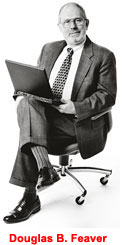
 |
washingtonpost.com enjoyed record traffic during the election season and the Florida contretemps that followed because of the extraordinary cooperation that had developed between the old – and new – media arms of the company in the months preceding the election. That cooperation was possible because key players in The Washington Post newsroom in the District of Columbia and washingtonpost.com newsroom in Arlington, Virginia, met regularly, beginning with the primary season, to plan and coordinate their coverage of the conventions and the election. In the process they forged the kind of personal and business relationships that engender mutual respect, an essential element in any successful partnership. The result of those discussions was that both sides had their acts together when the election turned out not to be over November 7, and each side had learned enough about what the other does well to take advantage of the opportunities. News on the Internet is not the same as news in print, and not the same as news over radio or television. The Internet does make it possible to combine the depth of print with the immediacy of broadcast, and also provides opportunities to do even more than print can for those who want to dig deeply into a subject. Since we are not limited by press capacity or newsprint concerns, we can run the complete text of all the campaign speeches and statements. If you don’t want to accept a boiled-down summary, the original words are all there. Court opinions became particularly important when Election Day was over and the Florida story began. We at washingtonpost.com got so good at posting the opinions within minutes of their issuance that Post reporters – and many others, we learned later – were using our site as a primary source. washingtonpost.com shot its own video during the campaign and election, and photographer Travis Fox’s work won three awards from the television division of the White House News Photographers’ Association. We launched video clips of important moments, then informed them with analysis from The Washington Post’s political experts. We posted terrific photo packages (the Internet is a highly visual medium) without having to worry about how many pages they would eat up. And readers who came late to the political story and wanted to find out what preceded Election Day could discover on washingtonpost.com the extraordinary Post biographies of George W. Bush and Al Gore that ran in the newspaper weeks before the election. This cooperative effort was led at washingtonpost.com by Mark Stencel, the managing editor for washingtonpost.com’s OnPolitics. Stencel’s work has provided a blueprint for improved cooperation between the Internet site and The Post newsroom in other important areas of coverage, including local area news and entertainment and the challenge of making Washington fathomable to the rest of the nation and the world. In my opinion no one yet has mastered the best ways to do these things on the Internet. Everything is an experiment. Some things work, some don't. The technology has a long way to go before it matches the reliability of print or the ease of pointing the clicker at the Zenith. Nonetheless, it does have some clear advantages for presenting, on demand, sights and sounds and tabular material far too extensive for either print or broadcast to handle. In 1996 most Internet news sites crashed at some point on Election Night because the demand was too heavy for the electronic infrastructure to support. On Election Night 2000, washingtonpost.com was able to provide continuously updated vote totals for every congressional and senatorial race nationwide, for all governors’ contests, and for every Washington-area local election. We did so without a technological hitch. |
|||
|
||||
|
||||
|
||||
|
||||
|
|
|
|||
![]()